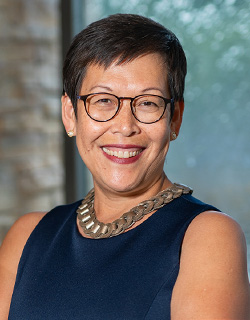Mindfulness Practices to Ease Holiday Stress
December 23, 2019
My path to mindfulness started with yoga ten years ago. Practicing yoga helped me reconnect my mind and body. I started on a journey of self-education about mind-body techniques to relieve stress and promote resilience for myself and my pediatric patients. In Fall 2016, after attending a five-day Mindful Practice Workshop at the University of Rochester School of Medicine led by Drs. Ron Epstein and Mick Krasner, I knew I had to share this transformative healing modality with my fellow physicians at GBMC.
Dr. Melissa Sparrow and the GBMC Medical Staff Office agreed to fund mindfulness training for GBMC physicians in 2017. Dr. Ron Epstein kicked off GBMC’s mindfulness program with a half-day workshop to introduce mindfulness techniques to help clinicians build resilience and decrease risk of burnout. Dr. Epstein’s presentation was very well-received by attendees; clinicians asked for more. A Mindfulness-Based Stress Reduction (MBSR) course for physicians was introduced in fall 2017 and the results were pronounced. These experiential learning sessions occurred over an eight-week period with classes meeting two hours weekly. The course received rave reviews from attendees. Pre- and post-course surveys using the Maslach Burnout Inventory showed significant improvement in patient engagement and communication, self-reported stress, burnout and mindfulness. All survey respondents reported they would recommend the program to others.
The Medical Staff Office was only able to fund the program for two semesters, but the effects were palpable. Participants of the program still meet regularly for mindfulness meditation and rotate leading the sessions. Vice President of Human Resources at GBMC, Anna-Maria Palmer, attended some of the mindfulness sessions in spring 2019 and subsequently agreed to fund mindfulness meditation for the entire GBMC staff twice per month with the certified MBSR teacher who taught the first two MBSR courses at GBMC. Dr. Mary-Louise Collins and myself continue to lead meditations about once per month.
I am excited about this effort and hope to be able to expand to other mind-body modalities in the future for staff and patients. I believe passionately in the power of mindfulness and mind-body techniques both professionally and personally – and not just for medical professionals. As a pediatrician, I have taught various mind-body practices to my young patients to enhance self-awareness, self-regulation and self-compassion for ADHD, anxiety and depression. My vision is to establish an Integrative Medicine Program for adults and children at GBMC.
As we enter the holiday season filled with family and social obligations, we often experience mixed feelings of excitement and anxiety. I would like to share some mindfulness practices to help strengthen your resiliency muscles.
1. Start with awareness of your breath.
Focusing on the breath allows you to reconnect with the mind-body continuum and return it to a state of balance. The physical slowing of the breath stops the sympathetic system’s fight or flight response, allowing the parasympathetic system to activate the relaxation response.
Practice Dr. Andrew Weil’s 4-7-8 relaxation breath. Sit in a comfortable position and place the tip of your tongue on the tissue right behind the top front teeth. Exhale deeply through your mouth. Inhale through your nose for four seconds. Hold the breath for seven seconds. Exhale forcefully through the mouth, pursing the lips and making a "whoosh" sound for eight seconds. Repeat cycle four times. If 4-7-8 is too long, keep the ratio and try 2-3.5-4 breath variation. Practice this breathing technique twice a day for a week and notice how you feel after the practice. Use this 4-7-8 relaxation breath whenever you encounter or anticipate a challenging situation. Take notice of how you feel after this practice.
2. Practice gratitude.
Research shows people who practice gratitude feel more optimistic, experience more joy and pleasure, feel less lonely and isolated, suffer less depression and sleep better. Take a moment every day to jot down five things you are grateful for. Do not overthink. It may be as simple as a sunny day. Stay alert for simple acts of kindness from others throughout your day, observe how you feel and savor that feeling. Practicing gratitude daily helps train the mind to see situations in a more positive light.
3. Adopt an attitude of self-compassion.
Self-compassion is awareness of your emotions when something does not work out as planned. Observe and acknowledge those feelings related to the failure. Refrain from feeding your inner judgmental critic. Self-criticism destroys resilience. Making mistakes is human. Remember to speak to yourself as you would a friend who encountered disappointment, with warmth and kindness.
4. Practice compassion for others.
Be kind for you do not know what battles each person is fighting. Assume the best in an unknown situation. Perform an act of kindness every day; it increases your well-being. Service to others nourishes your community and yourself. You will feel inspired and energized. Moreover, when we feel compassion, our heart rate decreases and our relaxation response activates.
5. The culmination of self-compassion and compassion for others is loving-kindness meditation.
Start in a comfortable seated position with eyes closed. Take a few slow deep breaths to relax the body. Then breathe slowly at your own comfortable pace. Bring to mind someone whom when you think of them, you feel happy. You may choose a friend, partner, child or pet. Have a sense of them in front of you and notice how you feel inside- perhaps warmth to your face, a smile, a sense of expansiveness. This is loving-kindness.
This natural feeling is always accessible to you at any moment. Begin to wish this loved one well. You may choose your own phrases to offer good wishes or use the following phrases:
May you be happy and peaceful.
May you be healthy and strong.
May you be free from stress and anxiety.
May you have ease and well-being.
Gently repeat these good wishes. Observe your feelings with curiosity. Bask in the warmth of these feelings. Now imagine this loved one turns around to send this loving-kindness back to you.
May you be happy and peaceful.
May you be healthy and strong.
May you be free from stress and anxiety.
May you have ease and well-being.
Allow yourself soak up these good wishes, flowing through your body from heart down. See if you can now send loving-kindness to yourself.
May I be happy and peaceful.
May I be healthy and strong.
May I be free from stress and anxiety.
May I have ease and well-being.
May I accept myself just as I am.
Observe your feelings with curiosity. Be patient and kind with yourself. Finally, bring to awareness, all beings everywhere and repeat the same good wishes.
May you be safe and free from danger.
May you be happy and peaceful.
May you be healthy and strong.
May you be free from stress and anxiety.
May you have ease and well-being.
May you experience great joy.
Gently repeat these good wishes. Imagine this loving-kindness flowing and touching everyone you encounter: people you know, people you love, people with whom you have difficulty, strangers. Imagine reaching out and touching each person or animal who has received this loving-kindness. Each person is changed as are you. Loving-kindness meditation takes time to embody. Be patient and kind with yourself and everyone you encounter.
Living mindfully requires intentional daily practice whether it is through meditation or brief mindfulness exercises. Just as you may dedicate yourself to training for a marathon, dedicate yourself to training your mind for your best life. May the warmth and joy of this holiday season envelop you in calm and relaxation.




